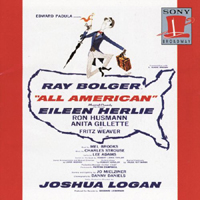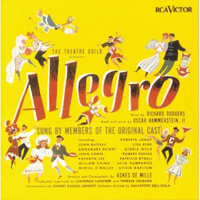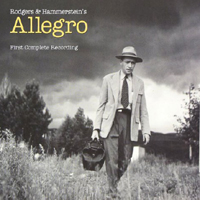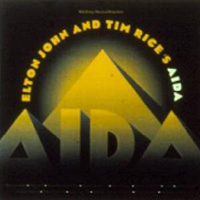 Original Broadway Cast, 1962 (Columbia/Sony)
Original Broadway Cast, 1962 (Columbia/Sony)  (3 / 5) How many Joshua Logan flops can a person do in one year? Anita Gillette managed two in 1962, soubretting through Mr. President and this provincial-college satire-with a book by Mel Brooks, no less. (That sure sounds like Brooks in the opening number as recorded for this cast album, exclaiming “Look at him, the Lone Ranger!”) Columbia gave both shows the deluxe treatment, but this score, by Charles Strouse and Lee Adams, is by far the more felicitous. Robert Ginzler’s orchestrations are among the best Broadway has ever heard; listen to the brass well up halfway through “If I Were You,” and try not to smile. Star Ray Bolger is a little short on vocal equipment — and, more surprisingly, on star quality. But his vis-a-vis, Eileen Herlie, is wonderful, particularly when helping Bolger introduce “Once Upon a Time.” Sturdy-voiced juvenile Ron Husmann gets an even better ballad, “I’ve Just Seen Her,” and Gillette smolders through “Night Life.” A few of the other songs are by the numbers — the patriotic salute, the football rally fight song — but some quirkiness seeps through. Fritz Weaver, as a Madison Avenue sharpie, even gets a merciless send-up of “Climb Ev’ry Mountain.” Pretty gutsy in 1962. — Marc Miller
(3 / 5) How many Joshua Logan flops can a person do in one year? Anita Gillette managed two in 1962, soubretting through Mr. President and this provincial-college satire-with a book by Mel Brooks, no less. (That sure sounds like Brooks in the opening number as recorded for this cast album, exclaiming “Look at him, the Lone Ranger!”) Columbia gave both shows the deluxe treatment, but this score, by Charles Strouse and Lee Adams, is by far the more felicitous. Robert Ginzler’s orchestrations are among the best Broadway has ever heard; listen to the brass well up halfway through “If I Were You,” and try not to smile. Star Ray Bolger is a little short on vocal equipment — and, more surprisingly, on star quality. But his vis-a-vis, Eileen Herlie, is wonderful, particularly when helping Bolger introduce “Once Upon a Time.” Sturdy-voiced juvenile Ron Husmann gets an even better ballad, “I’ve Just Seen Her,” and Gillette smolders through “Night Life.” A few of the other songs are by the numbers — the patriotic salute, the football rally fight song — but some quirkiness seeps through. Fritz Weaver, as a Madison Avenue sharpie, even gets a merciless send-up of “Climb Ev’ry Mountain.” Pretty gutsy in 1962. — Marc Miller
Monthly Archives: December 2014
Allegro
 Original Broadway Cast, 1947 (RCA)
Original Broadway Cast, 1947 (RCA)  (3 / 5)
(3 / 5)
This recording presents only a small fraction of the score of Rodgers and Hammerstein’s third collaboration, a show that was both directed and choreographed by Agnes de Mille. The LP and CD editions were drawn from five 78-rpm records made shortly after the show’s 1947 premiere, so there’s less than 34 minutes’ worth of music here, with six songs and two dances excluded entirely. Granted, we’re not talking about a score that’s up to the level achieved by the masters in their previous two shows, Oklahoma! and Carousel. Still, this is accomplished work, even if the recording sounds antique. The story takes Joseph Taylor, Jr. from birth to middle age, so we witness the lad’s first steps (“One Foot, Other Foot”) and early courtship (the now sexist-sounding “A Fellow Needs a Girl” and the pulsating “You Are Never Away”). “Money Isn’t Everything” is a nifty waltz, and “The Gentleman Is a Dope” a stirring complaint, each displaying Oscar Hammerstein in a rare cynical mood. Richard Rodgers’ biggest missteps occur at the end of each act. First comes a wedding ceremony wherein the composer sets the famous vow “to have and to hold from this day forward” to a solemn melody instead of a joyous one that just might have become a standard at real-life nuptials. Similarly, at the end of the show, the music for “Come Home” (a command that Joe obeys) is so dreary that it seems to mark a defeat for the hero. The title song of the musical defines the term “allegro” as “brisk, lively, merry, and bright,” but those two numbers certainly don’t fit that description. — Peter Filichia
 Studio Cast, 2009 (Sony Masterworks Broadway)
Studio Cast, 2009 (Sony Masterworks Broadway)  (5 / 5) At last, after decades of waiting, the powers-that-be got on the ball and gave us a stem-to-stern Allegro so glorious that even R&H haters have to be impressed. The recording is almost three times more generous than the original, 100 heavenly minutes and 15 lovely seconds spanning two discs. And perhaps this should be described as a work by Rodgers and Hammerstein and Rittman, for the illustrious dance music arranger Trude Rittman offers 20-plus minutes of her brilliant work here. Disc One promises quite a show right from the overture. You’ll hear a bit of a song you hadn’t heard on the original cast album, “A Darn Fine Campus, ” and that’s just the first hint of all the additional material: There’s more from the chorus on Joe’s birth and his time as an infant, a dance representing what Joe and his classmates did in nursery school, and a less joyous sequence after his beloved grandmother dies. Collegiate Joe does seem to be happy to be in “A Darn Nice Campus” –- until he comes to the conclusion that he’s homesick. (“Poor Joe,” sings the chorus.) When Joe marries Jennie, we hear more of the wedding and his best friend Charlie’s feelings that he’d prefer to stay single. Disc Two starts with an Entr’acte that reminds us of four pleasant songs we’ve already heard. There’s also the mindless-chatter song “Yatata,” which at least one etymologist has insisted was the precursor of today’s “Yada, yada, yada.” And the title song is augmented with much more music, as is the finale. There are terrific performances from Patrick Wilson as Joseph Taylor, Jr.; Laura Benanti as the base-metal Jennie, who sounds as if she has enough acid in her veins to fill the batteries in a fleet of automobiles; Norbert Leo Butz as Joe’s best friend; Audra McDonald as Joe’s mom; and Maureen Brennan, Danny Burstein, Liz Callaway, and Judy Kuhn in other roles. Add to that Stephen Sondheim in a brief appearance during the finale. (Yes, that Stephen Sondheim. He was, after all, there at 17 with the original production where, as he writes in the liner notes for this recording, he “typed scripts, got coffee, listened to Agnes de Mille maltreat singers, and watched this quite remarkable show come to life. I think I might not be so attracted to experimental musicals if I hadn’t wet my feet with Allegro.” ) While the original orchestra had 35 pieces, here esteemed conductor Larry Blank leads no fewer than 50, with nary a synthesizer among them. Listening to the 1947 recording and then this one demonstrates how cast recordings have come — to quote one of Oscar Hammerstein’s lyrics from this show — so far. — P.F.
(5 / 5) At last, after decades of waiting, the powers-that-be got on the ball and gave us a stem-to-stern Allegro so glorious that even R&H haters have to be impressed. The recording is almost three times more generous than the original, 100 heavenly minutes and 15 lovely seconds spanning two discs. And perhaps this should be described as a work by Rodgers and Hammerstein and Rittman, for the illustrious dance music arranger Trude Rittman offers 20-plus minutes of her brilliant work here. Disc One promises quite a show right from the overture. You’ll hear a bit of a song you hadn’t heard on the original cast album, “A Darn Fine Campus, ” and that’s just the first hint of all the additional material: There’s more from the chorus on Joe’s birth and his time as an infant, a dance representing what Joe and his classmates did in nursery school, and a less joyous sequence after his beloved grandmother dies. Collegiate Joe does seem to be happy to be in “A Darn Nice Campus” –- until he comes to the conclusion that he’s homesick. (“Poor Joe,” sings the chorus.) When Joe marries Jennie, we hear more of the wedding and his best friend Charlie’s feelings that he’d prefer to stay single. Disc Two starts with an Entr’acte that reminds us of four pleasant songs we’ve already heard. There’s also the mindless-chatter song “Yatata,” which at least one etymologist has insisted was the precursor of today’s “Yada, yada, yada.” And the title song is augmented with much more music, as is the finale. There are terrific performances from Patrick Wilson as Joseph Taylor, Jr.; Laura Benanti as the base-metal Jennie, who sounds as if she has enough acid in her veins to fill the batteries in a fleet of automobiles; Norbert Leo Butz as Joe’s best friend; Audra McDonald as Joe’s mom; and Maureen Brennan, Danny Burstein, Liz Callaway, and Judy Kuhn in other roles. Add to that Stephen Sondheim in a brief appearance during the finale. (Yes, that Stephen Sondheim. He was, after all, there at 17 with the original production where, as he writes in the liner notes for this recording, he “typed scripts, got coffee, listened to Agnes de Mille maltreat singers, and watched this quite remarkable show come to life. I think I might not be so attracted to experimental musicals if I hadn’t wet my feet with Allegro.” ) While the original orchestra had 35 pieces, here esteemed conductor Larry Blank leads no fewer than 50, with nary a synthesizer among them. Listening to the 1947 recording and then this one demonstrates how cast recordings have come — to quote one of Oscar Hammerstein’s lyrics from this show — so far. — P.F.
Ain’t Misbehavin’
 Original Broadway Cast, 1978 (RCA, 2CDs)
Original Broadway Cast, 1978 (RCA, 2CDs)  (4 / 5) Manhattan Theatre Club presented Ain’t Misbehavin’ to rave reviews before its hugely successful transfer to Broadway. What this show had that other composer songbook revues have lacked was tremendous theatricality, sparkling personality, and a cast of then-unknowns that rocked the theater: Nell Carter, Armelia McQueen, Ken Page, Andre De Shields, and Charlaine Woodard. These were not the pretty-but-bland sort of performers featured in revues that make one think of cruise ships and amusement parks. Under Richard Maltby, Jr.’s adroit direction, and thanks to unsung hero Murray Horowitz’s brilliant concept, this show featured performers of all shapes and sizes — and boy, could they sing, act, and sock Fats Waller’s songs into the rafters, with arranger extraordinaire Luther Henderson traversing the stage on a rolling piano. Ain’t Misbehavin’ was the first and arguably the last great songwriter revue to hit Broadway, and the recording beautifully captures the audio component of what was so very special about the experience. — Ken Bloom
(4 / 5) Manhattan Theatre Club presented Ain’t Misbehavin’ to rave reviews before its hugely successful transfer to Broadway. What this show had that other composer songbook revues have lacked was tremendous theatricality, sparkling personality, and a cast of then-unknowns that rocked the theater: Nell Carter, Armelia McQueen, Ken Page, Andre De Shields, and Charlaine Woodard. These were not the pretty-but-bland sort of performers featured in revues that make one think of cruise ships and amusement parks. Under Richard Maltby, Jr.’s adroit direction, and thanks to unsung hero Murray Horowitz’s brilliant concept, this show featured performers of all shapes and sizes — and boy, could they sing, act, and sock Fats Waller’s songs into the rafters, with arranger extraordinaire Luther Henderson traversing the stage on a rolling piano. Ain’t Misbehavin’ was the first and arguably the last great songwriter revue to hit Broadway, and the recording beautifully captures the audio component of what was so very special about the experience. — Ken Bloom
Aida
 Studio Cast, 1999 (PolyGram)
Studio Cast, 1999 (PolyGram)  (2 / 5) Before the Broadway launch of Aida, composer Elton John recorded this studio set with a host of pop stars, including Sting, Tina Turner, Janet Jackson, Shania Twain, and James Taylor. The songs are out of their show order, and no synopsis is included; yet, oddly, this is a more entertaining disc than the Broadway cast album. That’s because, swathed in elaborate pop arrangements, the songs are advantageously displayed as the middle-of-the-road standards they really are. The stars are well showcased; The Spice Girls, for example, lend some genuine oomph to “My Strongest Suit.” Elton John himself partners effectively with Heather Headley and Sherie Rene Scott in the trio “A Step Too Far,” and Headley solos on “Elaborate Lives.” Elton and Lulu also perform “The Messenger,” which is not to be found on the Broadway album. The set concludes with a bombastic “Orchestral Finale,” produced by Phil Ramone, that sounds like the perfect background music for an Olympic ice-skating competition. — David Barbour
(2 / 5) Before the Broadway launch of Aida, composer Elton John recorded this studio set with a host of pop stars, including Sting, Tina Turner, Janet Jackson, Shania Twain, and James Taylor. The songs are out of their show order, and no synopsis is included; yet, oddly, this is a more entertaining disc than the Broadway cast album. That’s because, swathed in elaborate pop arrangements, the songs are advantageously displayed as the middle-of-the-road standards they really are. The stars are well showcased; The Spice Girls, for example, lend some genuine oomph to “My Strongest Suit.” Elton John himself partners effectively with Heather Headley and Sherie Rene Scott in the trio “A Step Too Far,” and Headley solos on “Elaborate Lives.” Elton and Lulu also perform “The Messenger,” which is not to be found on the Broadway album. The set concludes with a bombastic “Orchestral Finale,” produced by Phil Ramone, that sounds like the perfect background music for an Olympic ice-skating competition. — David Barbour
 Original Broadway Cast, 2000 (Buena Vista)
Original Broadway Cast, 2000 (Buena Vista)  (1 / 5) The show’s a smash hit, so somebody must love it. On disc, however, shorn of spectacle and the leads’ good looks, Aida comes across as an extremely morose collection of Elton John power ballads. Amazingly, it took three writers — Linda Woolverton, Robert Falls (who also directed), and David Henry Hwang — to come up with the libretto, adapted from the classic opera. In their version, it’s a teen triangle with vague political overtones: Adam Pascal is Radames, captain of the Egyptian army, engaged to the air-headed clotheshorse Princess Amneris (Sherie Rene Scott). After subduing the nation of Nubia, Radames brings back the Princess Aida (Heather Headley), with whom he promptly falls in love. The three of them proceed to scream their heads off for two acts — lamenting cruel fate, etc., etc. There are a couple of catchy pop hooks in “The Gods Love Nubia” and “Written in the Stars,” but Tim Rice’s bone-headed lyrics drag everything down, as in the clunky “Elaborate Lives.” All three leads provide vocal thrills in abundance, especially Headley, whose intensely dramatic singing made her an instant star. Pascal does solid work throughout and Scott manages to keep her dignity even while performing the bizarre “My Strongest Suit,” in which Amneris exposes her extreme dedication to fashion.Still,this is one of the dullest entries in the pop-opera genre. –– D.B.
(1 / 5) The show’s a smash hit, so somebody must love it. On disc, however, shorn of spectacle and the leads’ good looks, Aida comes across as an extremely morose collection of Elton John power ballads. Amazingly, it took three writers — Linda Woolverton, Robert Falls (who also directed), and David Henry Hwang — to come up with the libretto, adapted from the classic opera. In their version, it’s a teen triangle with vague political overtones: Adam Pascal is Radames, captain of the Egyptian army, engaged to the air-headed clotheshorse Princess Amneris (Sherie Rene Scott). After subduing the nation of Nubia, Radames brings back the Princess Aida (Heather Headley), with whom he promptly falls in love. The three of them proceed to scream their heads off for two acts — lamenting cruel fate, etc., etc. There are a couple of catchy pop hooks in “The Gods Love Nubia” and “Written in the Stars,” but Tim Rice’s bone-headed lyrics drag everything down, as in the clunky “Elaborate Lives.” All three leads provide vocal thrills in abundance, especially Headley, whose intensely dramatic singing made her an instant star. Pascal does solid work throughout and Scott manages to keep her dignity even while performing the bizarre “My Strongest Suit,” in which Amneris exposes her extreme dedication to fashion.Still,this is one of the dullest entries in the pop-opera genre. –– D.B.

